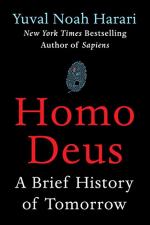
|
| Name: _________________________ | Period: ___________________ |
This test consists of 15 multiple choice questions and 5 short answer questions.
Multiple Choice Questions
1. Humanism changed our perception of war and its focus on heroes and generals to _____________.
(a) Tactical maneuvers.
(b) The common soldier.
(c) Battle strategy.
(d) the meaning of war.
2. Science undermines liberalism and what other humanist belief?
(a) Evolution.
(b) Animals are sacred.
(c) Individualism.
(d) Life has meaning.
3. How are modern teenagers acquiring an understanding of capitalism?
(a) Through their parent's examples and experiences.
(b) Through the influence of marketing.
(c) Through use of social media with people from other countries.
(d) Through civilization-style strategy games that focus on investment and growth.
4. Evolutionary humanism is based on the theory of which philosopher?
(a) Charles Darwin.
(b) Aristotle.
(c) Karl Marx.
(d) John Locke.
5. For what purpose is the U.S. military experimenting with implanting computer chips in the brains of soldiers?
(a) To treat physical injuries sustained in battle.
(b) To treat patients suffering from post-traumatic stress syndrome or PTSD.
(c) To lessen their fear during battle.
(d) To control soldiers remotely.
6. Where does Harari say new religions will come from?
(a) Third world countries.
(b) Superhumans.
(c) Government.
(d) Research laboratories.
7. Why is research about the healthy mind questionable?
(a) There were too many non-American subjects.
(b) The sample groups were too small.
(c) The experiments were faulty.
(d) Most of the subjects came from a group called WEIRD.
8. What pamphlet written by Karl Marx claims the modern world positively requires uncertainty and disturbance?
(a) The Problem of Other Minds.
(b) The Communist Manifesto.
(c) The Universal Declaration of Human Rights.
(d) Mein Kampf.
9. What non-invasive option are scientists using to learn about stimulating or inhibiting brain activities?
(a) Helmet-like devices fitted with electrodes.
(b) Imaging scans and electrodes.
(c) Electrodes attached to the skin.
(d) Imaging scans.
10. The expression, "The customer is always right" is an example of humanist _____________.
(a) Aesthetics.
(b) Economics.
(c) Politics.
(d) Ethics.
11. If we devote ourselves solely to economic growth, what social structure could suffer?
(a) Family ties.
(b) Religion.
(c) Education.
(d) Democracy.
12. What device is the U.S. army developing to improve a soldier's decision-making process?
(a) An immersion chamber.
(b) Implanted computer chips.
(c) An attention helmet.
(d) Virtual reality goggles.
13. What has replaced deploying large armies in today's military?
(a) Drones and satellite photos.
(b) Misleading social media information.
(c) Cybersecurity and satellite jamming.
(d) Drones and cyber-worms.
14. After World War I, what social movement did President Woodrow Wilson begin to support?
(a) Anti-slavery.
(b) Civil rights.
(c) Selective service.
(d) Women's sufferage.
15. The first Cognitive Revolution made Homo sapiens rulers of the planet. What could the Second Cognitive Revolution do?
(a) Make Homo deus lords of the galaxy.
(b) Make changes to Homo sapiens DNA.
(c) Give Homo sapiens the universe.
(d) Make Homo sapiens into Homo deus.
Short Answer Questions
1. Humanism is divided into which three branches?
2. Humanism claims that instead of looking to a supreme being or authority to define meaning, people should rely on _______.
3. Harari states that economic growth could be considered a religion because it provides solutions to which of life's dilemmas?
4. What causes people to believe in free will?
5. Humans can do whatever they choose and are only constrained by what?
|
This section contains 518 words (approx. 2 pages at 300 words per page) |

|




